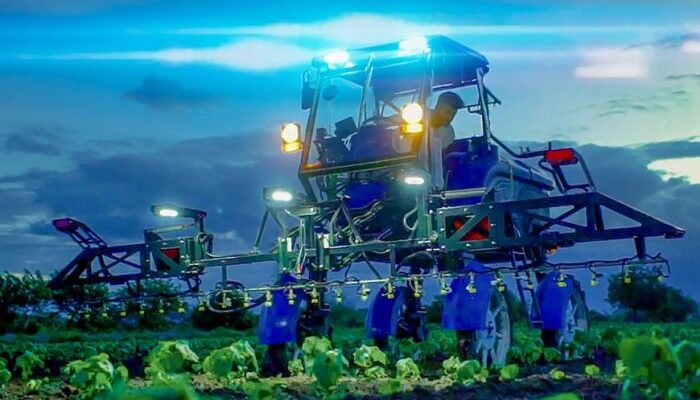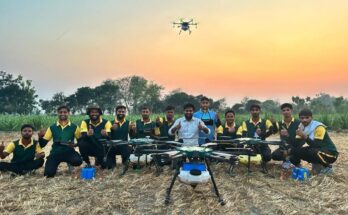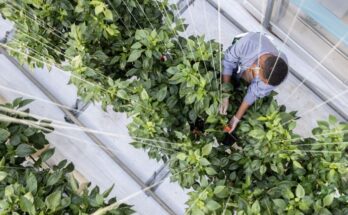Technology today has permeated every single aspect of our life. It has changed the way we make social connections, how we eat, sleep, communicate and perceive the world. It has accelerated many industries to grow exponentially, unlocking faster and easier ways to reach the end consumer. The Covid-19 pandemic further pushed many sectors that have traditionally been “tech fence sitters” to jump in with both feet to adapt and survive. This feverish pace of technology adoption is most evident in the growth spurt of home-grown direct-to-consumer e-commerce brands in India. But this flurry of technological disruptions is yet to take hold of the Indian agricultural sector.
Agriculture is pivotal to the Indian economy, employing 50 per cent of the population and contributing 20 per cent of the national GDP. Globally, India is one of the largest agricultural markets, trailing only behind China. As the world’s second most populous country at nearly 1.4 billion people and one of the largest producers of staple food grains, the Indian agriculture sector is ripe for technological disruptions. Past few years, many agritech startups are leading the way for this much-needed tech revolution in this sector.
You may also like to read: ReshaMandi introduces version 2.0 of its IoT device to assist farmers in improving crop quality
All stages of farming from procurement to preparation, sowing to spraying, harvesting to holding, and selling to scaling can benefit from tech-led solutions. Most Indian agricultural activities continue to be wisdom led and labour-intensive. Automation in Indian agriculture was ushered in by tractors almost half a decade ago, bringing large-scale growth benefits to the sector. Tractor-led automation is only the first step because tractors are only devices that work more quickly but not always more intelligently or precisely. The next tech revolution in Indian agriculture will be about bringing intelligence to automation. This can be achieved by seamlessly integrating Artificial Intelligence (AI) with robust hardware and creating artificially intelligent crop robots that can do laborious farm work like seeding, spraying, and harvesting with scientific precision and unmatched speed.
AI crop robots doing precision farming is the new sustainable tech revolution a country like India needs. Farming in India is highly labour-dependent and finding reliable labour to perform time-bound seasonal tasks is very challenging. AI-powered crop robots are equipped to take on these labour-intensive tasks and perform them with precision saving time, effort, and money for farmers It has the potential to transform agriculture from a “manned” to a “hybrid” industry.
Accessible and reliable crop robots that can automate laborious farming tasks that farmers today struggle to perform optimally. One such key task in agriculture is spraying. Farmers traditionally rely on blanket spraying, which involves indiscriminately applying agrochemicals across entire fields, regardless of whether it is plant or soil. Technically, chemicals need to be applied only to plants to protect them and not to the soil. The traditional method of blanket spraying results in excessive use of chemicals and water, making it highly unsustainable. Moreover, manual application using knapsack sprayers exposes workers to health risks. The inconsistency of blanket spraying can result in either over or under-spraying of chemicals, leading to decreased crop protection or compromised soil integrity, food safety, and groundwater contamination. This method increases chemical costs and depletes soil nutrition over the long term, which is detrimental to farmers.
You may also like to read: Leads Connect launches ‘Agrani’ platform to streamline agricultural value chain
This is where technological disruptions like AI-based precision sprayers come to the rescue. Precision spray robots use AI and deep-tech machine learning capabilities to spray only on plant foliage and spare the soil from unwanted chemical exposure. Such precise application can result in massive chemical input saving for the farmers. It also shields the soil from unwanted chemical exposure, preserving its nutritional value for the long term. AI-based precision sprayers can also precision deliver fertiliser dosages to plants resulting in plant-level agronomy which can be immensely beneficial to farmers. In the long run, precision robotics can grow into a predictive data advisory model providing critical insights to the farming community like never before.
AI-powered precision spray robot is an example of how crop robots can significantly improve farming efficiency. Crop robots have the potential to revolutionise agriculture for the better. Thanks to ground-breaking AI innovations, the “compute” function of robots is becoming increasingly powerful, enabling small-scale models to run on reliable, portable robots. As software becomes more intelligent, hardware is becoming more affordable. This combination is the key to scaling up robotics in agriculture and paving the way for a robotics revolution in Indian agriculture.
(Jaisimha Rao is the founder & CEO of Niqo Robotics, formerly known as TartanSense. Views expressed in the article are author’s own.)





Good article. Certainly, AI will help Indian agriculture. I wish to know whether we have agribots which can perform variable applications of inputs in our country. If so please let us know.
Thanks
Dear agriculturepost.com admin, Your posts are always well presented.
Very good article. The coming time is of artificial intelligence only and the need of advance robot is very high, with its help we will be able to produce more.
Good article. The coming time is of artificial intelligence only and the need of advance robot is very high, with its help we will be able to produce more. thanks for this valuable information.